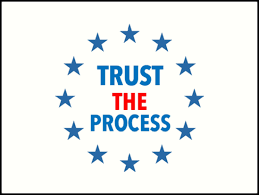You need to be crystal clear in your job search, from your personal marketing materials to asking people for help.
Keep it Short, but Sweet… and Interesting
First, you must know yourself and be able to clearly and concisely describe the skills and value you can bring to an organization. Take Inventory (the first step of the TRUST Success Model) of what you do best and know how that has led to your success. Your message needs to be compelling and leave the listener with a clear understanding of what you’re looking for. This should be so well-rehearsed that it sounds natural and can be adapted to the level of expertise of the person you are speaking with.
Get Clear on Where to Look
In “A Crash of Fate”, Zoraida Cordova “writes, “Sometimes heading in the right direction required taking a few steps backward.” Everybody in career transition wants to land as soon as possible. The paradox is that to do that, you need to take your time and get really clear on where you want to go. Be specific about the industry you’re interested in. Target as many companies as you can. Focus your search and tailor the messages you are putting out there to be seen.
Who’s Your Audience
Do not limit yourself to hiring managers or people in leadership roles. The data suggests that as many as 80% of jobs are gotten through someone you know (aka networking). You may not know the person who will help you get there now, but the more people you interact with, the better the chances it will happen sooner rather than later. This could be anyone from a fellow volunteer to a soccer mom or dad to the general manager of an organization only slighted related to your industry of interest.
What to Say
“Give me your resume and I’ll keep an eye open for any opportunities for you” is a nice sentiment, but it rarely leads to anything. People have good intentions but work and life distractions can quickly push that thought from the forefront of their minds. In a networking conversation, after learning about your contact, talk about what you’ve done in your career, the type of work you excel in, your industries of interest and the target companies you’re focused on.
Specificity is Critical
Make sure that your contact is clear about your background, skills and where your interests are. Read body language and facial expressions and if there is confusion, clarify it. Don’t leave it to your contact to interpret your answer without you making sure they understand it as you want them to. And, specifically, ask if there is anyone they can introduce you to that will help you gather more information for your search. It’s not about asking for a job as much as asking for help to get a conversation with the right people.
You are the one who has the clearest understanding of what you want to do next and how your skills and background make you suited to do it. Take the time to make sure you can explain it to anyone at any level in order to get the help you need to land your next role.
If you want help identifying the steps of the process to help you plan for winning your next job opportunity, click here to receive a short guide entitled “The Sher Process to Your Next Job”




